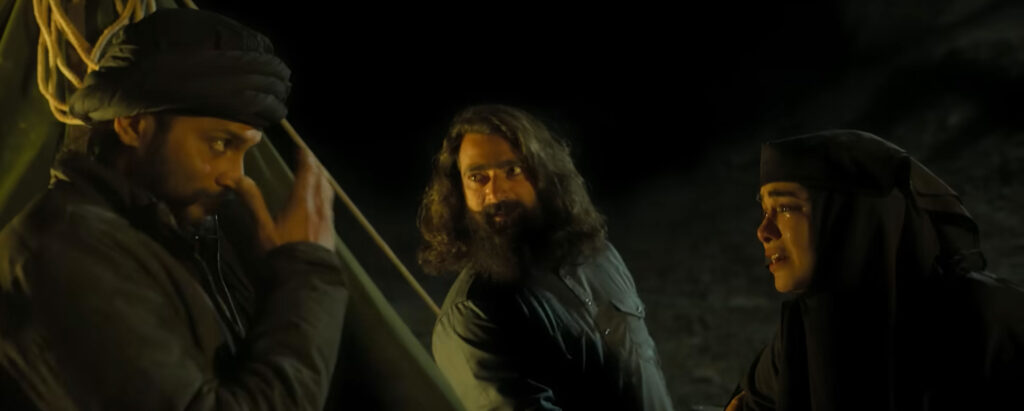Adah Sharma, Devadarshini, drama, India, Jagat Rawat, movies, Pranav Mishra, Pranay Pachauri, reviews, Siddhi Idnani, Sonia Balani, Sudipto Sen, The Kerala Story, Usha Subramaniam, Yogita Bihani
May 23, 2023
by Carla Hay

Directed by Sudipto Sen
Hindi with subtitles
Culture Representation: Taking place in India, Afghanistan, Sri Lanka, and Syria, the dramatic film “The Kerala Story” features a South Asian and Middle Eastern cast of characters representing the working-class, middle-class and wealthy.
Culture Clash: Three nursing students in Kerala, India, have hellish experiences when they are targeted to be brainwashed and abused by ISIS terrorists.
Culture Audience: “The Kerala Story” will appeal primarily to people who are interested in watching “women in peril” stories that are supposed to be based on real people, but the movie looks like a lot of exaggerations and half-truths for dramatic purposes.

Even without the controversy surrounding the dramatic film “The Kerala Story,” the movie seems insulting to the real people whose suffering inspired this exploitative movie to get made. This timeline-jumping, messy melodrama wants to depict how women become human trafficking victims of terrorists. However, the film does it in an irresponsible and deceptive way. “The Kerala Story” goes overboard in excusing certain people of certain crimes.
Directed and co-written by Sudipto Sen, “The Kerala Story” exposes its credibility problems when it’s repeatedly stated in movie that about 32,000 to 50,000 women and underage girls have gone missing in Kerala, India, because they’ve been brainwashed, pressured or outright kidnapped into becoming concubines and accomplices for ISIS terrorists. Kerala (the largest geographical state in India) has a population of more than 34 million people. Although human trafficking for terrorism absolutely exists in many parts of the world, several government officials and independent experts have vehemently denied that 32,000 females have disappeared from Kerala for these reasons.
The filmmakers of “The Kerala Story”—including and Sen and “The Kerala Story” co-writers Vipul Amrutlal Shah (who is the movie’s producer) and Suryapal Singh—have since backtracked and publicly stated that the 32,000 to 50,000 statistic is not entirely accurate. Instead, the filmmakers say they can only verify the stories of the three women who are the basis of the three main victim characters in the movie. (All of these women’s real names have been changed in the movie for privacy reasons.)
“The Kerala Story” has an epilogue with updates on the real-life counterparts of the characters depicted in the movie. One of the female survivors, who is given the alias Nimah Mathews in the movie, is shown speaking in the epilogue, with her face in shadows to protect her identity. The epilogue also states that the families of these victims are still fighting for justice. But “The Kerala Story” does a disservice to justice when it doesn’t seem to care about being completely truthful about the facts.
“The Kerala Story” begins by showing an Indian woman being interrogated in a detention center because she has been arrested for being a suspected terrorist. Her name is Shalini Unnikrishnan (played by Adah Sharma), but law enforcement knows her under another name: Fatima Ba. It’s believed that she changed her name to Fatima Ba after she converted to Islam.
In the interrogation room, Shalini/Fatima (who has noticeable physical scars on her face) is world-weary but defiant. She tells the interrogators that instead of wondering what her real name is, they should be trying to find out how a former nursing student like herself could end up in this situation. It’s shown in the movie that just two years earlier, Shalini was an eager and naïve student at National Nursing College in Kerala.
The movie then flashes back and forth in a jumbled timeline to show what happened to Shalini and two of her nursing school roommates when they became the targets of ISIS terrorists. There was a fourth roommate who was the catalyst for the three victims to fall prey to the ISIS terrorists who would traffic and abuse the three nursing students in the worst ways possible. This fourth roommate was able to establish the trust that made it easier for the victims to be deceived.
On the move-in day in their nursing school dorm, Shalini meets her three roommates: Nimah Mathews (played by Yogita Bihani), Gitanjali Melam (played by Siddhi Idnani) and Asifa Ba (played by Sonia Balani). All of the women seem outgoing and friendly, by Asifa is the most serious and the most emotionally guarded of the four roommates. Shalini, Nimah and Gitanjali will find out the hard way that Asifa’s friendliness is all a façade, because she is part of a conspiracy to get them to join ISIS.
Asifa is a strict Islamic who always wears a hijab. Shalini and Gitanjali are Hindu. Nimah is Catholic. As time goes on, Asifa begins to lecture her three roommates about how Islam is the only religion where they can have spiritual protection. There’s a scene in the movie where Aisfa outright tells her three roommates that the roommates “will surely got to hell” if they are not Islamic.
This idea is reinforced one day when all four women are at a shopping mall, and the three non-Islamic roommates experience an unnerving attack. Shalini, Nimah and Gitanjali are all sexually harassed and physically assaulted by some young men. One of the men rips Nimah’s shirt off of her. Witnesses who see this attack stand by and do nothing. Shalini, Nimah and Gitanjali don’t know that Asifa secretly arranged this assault.
A humiliated and shaken Shalini, Nimah and Gitanjali go back to their dorm room with Asifa, who lectures them that they probably wouldn’t have been attacked if Shalini, Nimah and Gitanjali had been wearing hijabs to show that they are Islamic. Nimah is a devout Catholic who doesn’t really believe what Asifa is saying. However, Shalini and Gitanjali start to believe Asifa and are eventually convinced to convert to Islam.
Part of this lure includes Asifa introducing Shalini and Gitanjali to two of her handsome Islamic bachelor friends: Rameez (played by Pranay Pachauri) and Abdul (played by Pranav Mishra), who are charming and polite. And it isn’t long before Shalini starts dating Rameez, while Gitanjali starts dating Abdul. Shalini and Gitanjali think that their relationships with these boyfriends are “true love.” Rameez says he’s a medical student who comes from an affluent family in Syria, so that makes him even more appealing to Shalini, who soon starts to think that Rameez could be her future husband.
As shown in secret meetings and conversations that Asifa has with her ISIS cohorts, it’s all part of an elaborate plan to get Shalini and Gitanjali to move to Syria and become concubines and accomplices of ISIS terrorists. Asifa also deliberately gets Shalini and Gitanjali hooked on amphetamines. Asifa explains to Shalini and Gitanjali that these drugs will give them more energy for the rigorous studies of Islam that can bring them closer to Allah. Gitanjali eventually begins abusing alcohol and other drugs too.
Asifa is annoyed that Nimah is the most difficult to brainwash. But later in the movie, Asifa sets up Nimah to go on a date with a man whom Nimah does not know is part of the ISIS group. He drugs and kidnaps Nimah, who is taken to Syria, where she is held captive and gang raped. All of it is shown in flashback scenes, but there’s a long section in the movie where the movie makes it look like Nimah just drifted apart from her three roommates because she was the only one of the roommates who never believed in Islam.
Part of the indoctrination process includes Asifa convincing Shalini and Gitanjali that the families of Shalini and Gitanjali are evil because they are not Islamic. Shalini already had a somewhat strained relationship with her widowed mother (played by Devadarshini), who is distressed and confused over why Shalini has further alienated herself from her. Somehow, Asifa has convinced Shalini that Hinduism could not save Shalini’s father from dying years earlier. In her brainwashed state of mind, Shalini thinks her father might still be alive if her family were Islamic and could have prayed to Allah to save her father.
Gitanjali has loving and supportive parents (played by Usha Subramaniam and Jagat Rawat), whom she treats horribly after she coverts to Islam. Unlike Shalini though, Gitanjali resists her lover’s pleas to move to Syria. In one of the worst scenes in the movie, Gitanjali’s father is in a hospital because he had a heart attack from all the stress over Gitanjali’s radical changes. Gitanjali goes to visit him while he’s barely conscious, just so she can spit on him because he’s not Islamic.
There are many other sordid scenes in “The Kerala Story,” including rape of a pregnant woman, physical abuse, revenge porn and other degradation. And while these terrible crimes are part of the horrors of human trafficking, “The Kerala Story” shows it all with a very Islamophobic tone. The ISIS terrorists in the movie are defined in only two ways: their religion and their abuse. In reality, a lot more goes into this type of terrorism than what is shown in the movie.
Shalini’s story becomes more tangled after she moves to Syria to be with Rameez. She gets pregnant by Rameez, who breaks up with her because he doesn’t think she’s worthy of being married to him. Pregnant and abandoned in a country she does not know, Shalini then gets into a quickie arranged marriage with an ISIS terrorist named Ishak (played by Vijay Krishna), who seems to be a “nice guy” at first to Shalini, but he’s actually a violent sadist. The acting in “The Kerala Story” ranges from mediocre to bad, while the screenplay and direction are schlocky.
Because “The Kerala Story” jumps around so much in the timeline, it’s shown near the beginning of the movie that Shalini is married to Ishak. It’s revealed much later in the film how she ended up in this bad marriage. Shalini tries to escape from Ishak and the ISIS terrorists. However, there’s no suspense in that part of the story, because the beginning of the movie already shows that she’s been arrested for suspected terrorism, which obviously means she didn’t escape from the terrorists.
Time and time again, “The Kerala Story” avoids mentioning or showing why Shalini was arrested. The crimes are serious enough that she could be in prison for years. And yet, the movie makes it look like the worst thing that Shalini did was be gullible enough to get fooled by an ISIS-recruiting roommate and fall in love with the wrong man. This avoidance of mentioning Shalini’s crimes is a huge and noticeable void that makes the movie look like it’s not interested in accuracy (even if the truth is unflattering to people who deserve sympathy) and is more interested in presenting these women’s true stories as a relentlessly tacky soap opera.
Sunshine Pictures released “The Kerala Story” in select U.S. cinemas on May 12, 2023. The movie was released in India on May 5, 2023.
